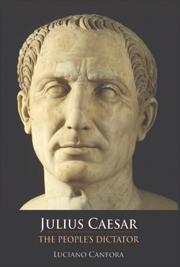Book contents
- Frontmatter
- Contents
- Translators' Note
- Acknowledgements
- Foreword
- PART I FROM SULLA TO CATILINE
- PART II FROM THE TRIUMVIRATE TO THE CONQUEST OF GAUL
- PART III THE LONG CIVIL WAR
- 16 Towards the Crisis
- 17 Striving after Tyranny?
- 18 Attacking the World with Five Cohorts
- 19 Caesar's ‘Programme’: In Search of Consensus
- 20 ‘Amicitia’
- 21 From the Rubicon to Pharsalus
- 22 Against Subversion
- 23 Alexandria
- 24 Caesar Saved by the Jews
- 25 From Syria to Zela
- 26 The Long Civil War
- 27 The Shoot of a Palm Tree: The Young Octavius Emerges
- 28 ‘Anticato’
- PART IV FROM THE CONSPIRACY TO THE TRIUMPH OF CAESARISM
- Chronology
- Bibliography
- Index
22 - Against Subversion
from PART III - THE LONG CIVIL WAR
Published online by Cambridge University Press: 05 August 2013
- Frontmatter
- Contents
- Translators' Note
- Acknowledgements
- Foreword
- PART I FROM SULLA TO CATILINE
- PART II FROM THE TRIUMVIRATE TO THE CONQUEST OF GAUL
- PART III THE LONG CIVIL WAR
- 16 Towards the Crisis
- 17 Striving after Tyranny?
- 18 Attacking the World with Five Cohorts
- 19 Caesar's ‘Programme’: In Search of Consensus
- 20 ‘Amicitia’
- 21 From the Rubicon to Pharsalus
- 22 Against Subversion
- 23 Alexandria
- 24 Caesar Saved by the Jews
- 25 From Syria to Zela
- 26 The Long Civil War
- 27 The Shoot of a Palm Tree: The Young Octavius Emerges
- 28 ‘Anticato’
- PART IV FROM THE CONSPIRACY TO THE TRIUMPH OF CAESARISM
- Chronology
- Bibliography
- Index
Summary
While Caesar was occupied with the difficult campaign in the Balkans, two episodes of particularly dramatic social unrest occurred in Rome; each ended in repression. The main player in the first was Marcus Caelius Rufus, one of the tribunes who in January 49 bc had found refuge with Caesar. Caelius Rufus, much of whose correspondence with Cicero has been preserved, had, on his return from the Spanish campaign against Afranius and Petreius, received the praetorship from Caesar for 48, but not the urban praetorship, which Caesar entrusted to Trebonius. This humiliated Caelius and increased his sense of disillusionment. The fact that Caesar, at the start of Commentaries, book 3, on the civil war gave a full polemical account of Caelius' action indicates that the praetor, by making himself the interpreter of the debtors' needs, had made considerable difficulties for the distant dictator. Caelius Rufus' action was meant to support the debtors' requests: he considered the Caesarian legislation on that issue disappointing. He himself, like Catiline fifteen years earlier, had personal reasons for warmly supporting a radical remission of debts. Caelius did not accept the principle of the valuation of property in Caesar's legislation (a prior condition for any partial reduction of debt). In his Commentaries Caesar perceives the need to argue directly and forcefully against the radical programme of Caelius: ‘for persons who admit their indebtedness to cling to the whole of their possessions, what an audacious, what a shameless spirit does that mark!’ Caelius, he continues, ‘proved himself harder to deal with than the very persons whose interests were concerned’.
- Type
- Chapter
- Information
- Julius CaesarThe People's Dictator, pp. 184 - 187Publisher: Edinburgh University PressPrint publication year: 2007

